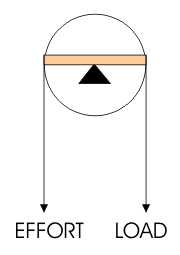Question #8a35a
1 Answer
For a simple machine mechanical advantage (MA) =
Efficiency =
Explanation:
Mechanical advantage =
So if we look at a simple 1 pulley system:

The effort = the load so
You can increase the number of pulleys to increase the
Gears work like this.
Velocity Ratio (
Again, in the 1 pulley system
Work done = Force x distance moved in the direction of that force.
If we divide
So this ratio is a measure of the work done on the load compared with the work done by the effort.
In an ideal world the work put in by the effort would equal the work done on the load. However, we don't live in an ideal world.
There are energy losses due to friction and heat etc which means that machines are rarely 100% efficient.
We usually express this as a percentage:

